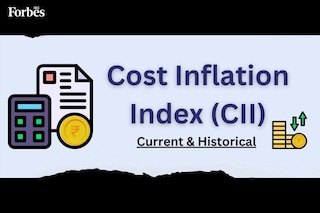Cost inflation index (CII) for FY 2024-25 to calculate capital gains
Want to understand how the Cost Inflation Index impacts your capital gains? This comprehensive guide breaks it down in simple terms


The Cost Inflation Index (CII) is a measure used by the Income Tax Department of India to account for inflation when calculating long-term capital gains on the sale of assets. It was a critical tool for taxpayers it helped reduce the tax burden on capital gains by adjusting the asset"s purchase price for inflation. However, an announcement during Finance Minister Nirmala Sitharaman"s Budget 2024 speech made it redundant.
In her seventh straight Union Budget speech, Sitharaman announced changes to the capital gains tax rates. The short-term capital gain tax rate on "specified" assets was increased to 20 percent from the previous 15 percent. She added that all other financial and non-financial assets will be taxed at the applicable rates. She also revised long-term capital gains tax rates, raising them from 10 percent to 12.5 percent for all assets while increasing the exemption limit for capital gains on some listed financial assets from Rs1 lakh to Rs1.25 lakh per year.
She also announced that the indexation benefit for property sales would be removed. This move implies that people selling their property can no longer adjust their purchase price using inflation. This will reduce their capital gains and increase their tax liability, and it has made the cost inflation index redundant.
The cost Inflation Index used to be important for anyone dealing with assets that can appreciate over time. It allowed you to calculate your capital gains and the tax due on them accurately, ensuring you don"t pay more tax than necessary.
Also Read: Section 80C: Income tax deduction and limits under section 80C, 80CCD in 2024
Here is the Cost Inflation Index (CII) from FY 2024-25 to FY 2001-02:
First Published: Jul 23, 2024, 15:04
Subscribe Now